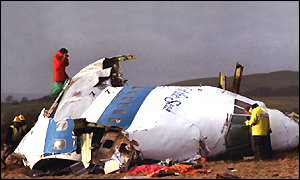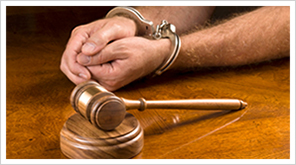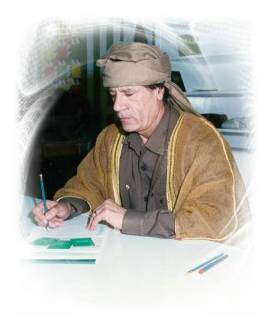On 27 November 1991,
the Lord Advocate obtained a warrant for the arrest of two Libyans,
Abdelbasset Ali Ahmed al-Megrahi and Ali Amin Khalifa Fhimah, on
charges of conspiracy to murder and breaches of the Aircraft
Security Act of 1982. An indictment in similar terms was handed
down by the US District Court of the District of Columbia on the
same day.
British and American
governments demanded that the two Libyans be surrendered so that
they could stand trial in either Scotland or the United States.
Libya refused to surrender the suspects because it had no
extradition treaties with either the UK or the US and that, in any
case, Libyan law prohibited the extradition of its own
nationals.
The two governments
then went to the UN Security Council, forcing through Resolution
731 of 21 January 1992 requesting the surrender for trial of the
suspects. After that request was refused, the Security Council
adopted Resolution 748 on 31 March 1992, this time in the form of a
demand that Libya renounce terrorism and surrender Al-Megrahi and
Fhimah for trial. The resolution gave just over two weeks to comply
after which a range of sanctions would be – and in the event were –
imposed on Libya. When the two Libyans were still not handed over
after a further 18 months, the sanctions were extended and
tightened by the Security Council Resolution 883 of 11 November
1993.
In the meantime, Libya
applied to the International Court of Justice against the UK and
US, stating that the matter was governed by an international
agreement, the Montreal Convention of 1971. Libya claimed that it
had fulfilled all its obligations under the Convention by detaining
the suspects and investigating the matter. The UK and US countered
by arguing that the Security Council resolutions overrode the
Convention.
The Court decided in October 1992 that the matter was not of
sufficient urgency to grant Libya provisional measures of
protection. In February 1998 the Court ruled on a number of
preliminary objections made by the two governments and declared
that it had jurisdiction to deal with the merits of the dispute
between Libya and the UK and US.
It was thought that a breakthrough had been made in early 1994,
when Professor Robert Black of Edinburgh University and Dr. Ibrahim
Legwell, the head of the Libyan defence team, agreed on a trial in
a neutral venue before a panel of international judges. Britain and
America refused to accept this compromise, demanding a trial in
either Scotland or the United States.
It became clear at the
beginning of 1998 that, despite sanctions, the two Libyans would
not be surrendered for trial. On 24 August, the two governments
went back to the Security Council proposing that the trial should
be held in the Netherlands before a panel of three Scottish judges
and with no jury. This offer was broadly accepted by Libya, which
reiterated its stance that it was for the two suspects and their
legal advisers to decide whether they would appear in the
Netherlands for trial.
On 5 April 1999, after
some months of discussions on concerns from the accused and their
lawyers, Al-Megrahi and Fhimah surrendered for trial in the
Netherlands at the Dutch military airbase of Valkenburg, just
outside The Hague. They were swiftly extradited to Scottish
jurisdiction at Camp Zeist, near Utrecht. Camp Zeist, a former
American airbase, had been agreed between the British and Dutch
governments as the most suitable site for the trial. On the second
of two appearances before Sheriff Principal Graham Cox Q.C.,
sitting at Camp Zeist, they were committed for trial on 14 April
1999. The trial proper began in 2000 and ended in February 2001.
Al-Megrahi was found guilty and Fhimah innocent.
Verdict &
Anomalies
The verdict that
Abdelbasset al-Megrahi was guilty, and his co-accused Ali Amin
Khalifa Fhimah innocent, was not unexpected. The verdict was the
outcome of a political show trial. Its aim was to continue to
demonise and pressure Libya and to show the power of the US and
British governments to punish whatever ‘enemy’ they choose,
regardless of evidence.
The Scottish law
professor, Robert Black, who devised the trial, called the evidence
“very, very weak” and was astonished by the verdict. He had
expected both Libyan nationals to be declared innocent. The British
families whose relatives were killed in the disaster were also
dismayed. They say the trial has not answered the questions that
lie at the dark heart of Lockerbie and are demanding a public
inquiry.
The sensationalistic
reporting surrounding the verdict leaves pressing questions
unanswered: why did Al-Megrahi do it? On whose orders did he act?
How much was known about the plot to blow up Pan Am 103? None of
these questions were answered by the verdict.
The Helsinki
Warning
A series of intelligence reports warning of a
planned 'Islamic' terrorist attack on a Western passenger plane
were passed to Western governments in the months and weeks before
the bombing. The so-called “Helsinki warning” was so specific that
it said a Pan Am flight travelling from Frankfurt to New York would
be targeted. The US took the threat seriously enough to post the
warning in its Moscow embassy. The public, however, was never
told.
There were also intelligence warnings that
claimed a suitcase bomb containing explosives hidden in a Toshiba
radio would be the method of getting the device on board the target
plane. The Lockerbie bomb matched the reports.
Rescheduling of Flights
for Top Brass
There are claims that a series of high-ranking
political figures and their relatives were scheduled to get on
board Pan Am flight 103 but never did. These include the former
South African foreign minister Pik Botha and the son of one of the
FBI’s highest ranking investigators, Oliver Ravel. The staff of the
American embassy in Moscow had the luxury of not getting on board
Flight 103. The public did not.
Other
Suspects
The trial dismissed as ‘coincidence’ the
activities of the organisation known as the Popular Front for the
Liberation of Palestine-General Command. The Popular Front,
operating in Germany, was found with bombs almost identical to the
one which went on board the Pan Am plane. All devices were
accounted for, apart from one – possibly the Lockerbie bomb. The
PFLP-GC was supported by both Iran and Syria. Although early
investigations pointed at the state’s involvement in the bombing,
Syria was rehabilitated when it became key to Western foreign
policy during the Gulf War. It was initially thought that Syria and
Iran plotted the bombing in revenge for a US naval vessel shooting
down of an Iranian airbus with massive loss of civilian life.
Intelligence Agency
Black Ops
The US government used routes such as Pan Am 103
to run controlled deliveries of drugs from the Middle East into
America. This was said to enable agents to follow the route of the
drugs and arrest criminals. However, there have been claims from
whistleblowers within the US intelligence services that this was
actually part of a complicated black operation intended to fund the
extreme right-wing Contra rebels in Nicaragua and send ransom money
to Beirut to free American hostages.
The Bomb
The timer that was said at the trial to have
caused the explosion could have been set for detonation at any time
– anything, in fact, up to 999 hours in advance, ensuring that the
plane was downed at sea and all forensic evidence sunk to the
bottom. It calls into question what type of timer was used, and who
was using it. Why would Libya – the supposed home of international
terrorism – use low-grade timers that would expose it to detection?
An expert on timers told the trial that the ice-cube timer would
have began its countdown seven minutes after take-off. That gives a
time before detonation of 37 minutes. Pan Am Flight 103 took off at
6.25pm and exploded 38 minutes later.
Sanctions
The fact that the United States issued a public,
rather than a sealed, indictment indicates that US authorities
never expected that the accused would ever actually be brought to
trial. Instead, US officials saw the indictment itself as a
diplomatic tool that would help them persuade members of the UN
Security Council to impose sanctions on Libya, thereby furthering
their goal of isolating the enemy of the day. UN sanctions were
imposed on Libya in 1992 as a result of its “refusal” to comply
with the investigations into the bombing over Lockerbie in
1988.
The so-called money bomb ended up costing Libya
more than $25 billion in lost revenue from 1992 to the present day.
The sanctions isolated Libya and the human anguish and distress
that they caused cannot be measured.
A special UN report, circulated to members of
the Security Council in 1998, revealed the extent of suffering
caused by sanctions. In addition to an embargo on international
flights, as well as on aircraft and aircraft parts, the sanctions
included a ban on arms imports, the downgrading of diplomatic ties
with Libya, a freeze on some Libyan assets abroad and a ban on some
equipment used at oil transportation terminals and refineries. The
sanctions deliberately targeted Libya’s economy and transport
infrastructure, and were designed to cause maximum discomfort to
children, the elderly, the sick and disabled.
The air blockade of Libya was particularly
destructive. Due to the embargo on airline spare parts, a Libyan
civilian airliner in 1992 crashed killing all 170 people aboard who
were of different nationalities. More than 9,000 medical patients
were affected by the air blockade, preventing them from receiving
urgent attention overseas. At least 350 patients died en route by
road transport to specialist medical care. On many occasions,
Western countries were refused permission to export vital medical
equipment to Libya.
The Lockerbie verdict of convenience proves that
the trial did not achieve either justice or truth. After the
verdict was announced, the US continued to pursue Libya, and its
leader Colonel Qadhafi. Americans now want law suits against Libya,
sanctions against the country continued and criminal charges
brought against the Libyan government.
US Secretary of State Colin Powell held a secret meeting with the
American families after the trial. Powell suggested that the US
wanted leading Libyans prosecuted and hinted that this meant
Colonel Qadhafi. State Department spokesman Richard Boucher
followed up with an official news briefing stating that “the United
States government position, which we’ve reiterated here again and
again, which the Secretary conveyed to the families when he talked
to them, is that we will follow the evidence wherever it leads…that
remains our position.”
Some ten UN Security Council members are said to agree that the
sanctions against Libya should be lifted. Other powerful and
influential organisations are in agreement that the sanctions
should be lifted. They include the Arab League, the Organisation of
African Unity and the Non-Aligned movement.
Despite pressure to lift sanctions against
Libya, the United States and Britain have applied political and
economic pressure to UN Security Council members so that action can
be delayed. So far, sanctions have only been suspended, not lifted.
The United States and Britain have boiled down a series of UN
Security Council resolutions to two demands before the sanctions
can be lifted entirely – an acceptance of responsibility by Libya
for the bombing and the payment of “appropriate” compensation to
the victims’ families. The US also continues its own separate
sanction regime on all commercial and financial transactions
between Tripoli and the United States.
Meanwhile, former South African president Nelson
Mandela continues to pursue diplomatic channels on behalf of Libya.
Mandela accused the West of shifting the goalposts regarding
sanctions in the wake of the Lockerbie trial verdict. He has most
recently met with British Prime Minister Tony Blair where he
pointed out that Britain had reneged on its undertaking to press
for the final lifting of sanctions against Libya.
Appeals
An appeal against conviction has been lodged by
Al-Megrahi. His chances of winning an appeal are slim, given that
only legal errors and inconsistencies of the Court within the scope
of the verdict can be considered for a successful appeal. Chances
for the introduction of possible new evidence are strictly limited
and in the Lockerbie case virtually impossible. A decision on his
appeal is expected by September.
However, Professor Robert Black says there are several basic errors
and mistakes that are contained in the verdict that should be able
to serve as a vehicle for a successful appeal. Professor Black, who
has supported the defense case, said he believed the appeal would
“centre on whether the judges were justified in their findings of
fact.”
He expects lawyers to maintain the evidence did
not prove that an unaccompanied suitcase was dispatched on the
morning of the bombing on an Air Malta flight. During the trial,
prosecutors presented baggage check-in records and summoned
passengers from the flight to show that one bag was not claimed.
The bag was alleged to have contained the explosive device.
Professor Black also said the appeal would probably challenge a
Maltese shopkeeper’s identification of Al-Megrahi as the man he
believed purchased the clothing found in the suitcase containing
the explosive.
Al-Megrahi’s lawyers had until April to lodge
the grounds for appeal. A decision on his appeal is expected by
September, and then a date will then be set for the hearing before
five Scottish judges. The appeal is expected to be heard at Camp
Zeist, and Al-Megrahi will remain in his specially constructed
prison at the site until then. If his appeal fails he will be
transferred to a Scottish prison – most likely Barlinnie Prison in
Glasgow.
The Future
In the latest development, Al-Megrahi has
announced that he is willing to take a lie detector test to prove
his innocence. He says he wants to take the test live, in front of
world television cameras, to be beamed around the world via
satellite, to prove his innocence of the charges brought against
him. His lawyer in Tripoli has asked that the necessary measures be
taken to conduct the test.
The lie detector test would prove that
Al-Megrahi is an innocent man who was not offered a fair trial and
was convicted in isolation from the rules of justice. It would
demonstrate that the rules of justice were badly applied to the
point that those who pursued Libya as the guilty party in the
Lockerbie disaster should be legally and morally accountable to the
world.
Libyan leader Muammar Qadhafi condemned the
verdict of the Lockerbie bombing trial as an “injustice.” The
Libyan leader said the United States and Britain had blamed his
country for political reasons and that the investigation before the
trial had not been neutral.
The Lockerbie case has now become a racist
pretext to prolong nine years of sanctions against Libya, and
Al-Megrahi has become a scapegoat to satisfy the families of the
victims and justify prolonging the embargo.
Al-Megrahi’s sentence
gives the United States a perfect pretext to carry out political
and economic blackmail on Libya. The credibility of Western
justice, that burned at the altar of Camp Zeist, is now at stake –
not Libya’s innocence.
From New Dawn No. 66, May-June 2001,
newdawnmagazine.com








